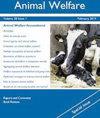A new approach to horse welfare based on systems thinking
IF 2.3
4区 农林科学
Q2 VETERINARY SCIENCES
引用次数: 7
Abstract
Globally, calls for change in the horse industry to prioritise the health and well-being of domestic horses (Equus caballus) are reaching a critical threshold. Horse behaviour deemed undesirable or inconvenient by owners (henceforth referred to as undesirable behaviour) is reported across all aspects of a horse's life and may indicate a welfare issue. This study proposes a reconceptualisation of undesirable horse behaviour as a complex challenge based on systems thinking. Emerging from the natural sciences, systems thinking is an interdisciplinary approach to complex challenges (such as undesirable behaviour) as dynamic, highly interconnected networks of components and feedback relationships. This critical literature review examined the undesirable behaviours studied, the disciplines conducting research and their underpinning assumptions to identify opportunities for approaching research differently. Four themes emerged from the literature: undesirable behaviour is typically studied with unarticulated assumptions and in individual disciplines; behaviours are typically studied in isolation with the complexity of horse-human interactions generally not considered; management of behaviour typically has an anthropocentric linear 'cause and effect' focus; and solutions to undesirable behaviour are often short-term 'fixes' resulting in poor horse outcomes. From these, we outline the opportunities that each provide the next generation of horse research in terms of interdisciplinarity, systems thinking and management. Undesirable horse behaviour in a horse-human system is conceptually mapped in terms of factors associated with the behaviour (eg housing, stress, diet), and the relationships between them. Systems thinking offers a way to integrate multiple disciplines and identify and navigate new solutions to promote horse welfare.基于系统思维的马福利研究新思路
在全球范围内,要求改变马业,优先考虑家马(Equus caballus)的健康和福祉的呼声正达到一个关键的门槛。马主人认为不受欢迎或不方便的行为(以下简称不受欢迎的行为)在马生活的各个方面都有报道,可能表明存在福利问题。本研究提出了一个重新概念化的不受欢迎的马行为作为一个复杂的挑战,基于系统思维。系统思维源于自然科学,是一种跨学科的方法,将复杂的挑战(如不良行为)作为动态的、高度互联的组件和反馈关系网络。这篇重要的文献综述检查了所研究的不良行为,进行研究的学科及其基础假设,以确定不同的研究方法的机会。从文献中出现了四个主题:不良行为通常是在未明确的假设和个别学科中研究的;行为通常是孤立地研究的,通常不考虑马与人相互作用的复杂性;行为管理通常具有以人类为中心的线性“因果”焦点;对不良行为的解决方案往往是短期的“修复”,导致马的结果不佳。从这些,我们概述了机会,每个提供下一代马研究方面的跨学科,系统思维和管理。马-人系统中不受欢迎的马行为是根据与行为相关的因素(如住房、压力、饮食)以及它们之间的关系进行概念映射的。系统思维提供了一种整合多学科的方法,并确定和导航新的解决方案,以促进马的福利。
本文章由计算机程序翻译,如有差异,请以英文原文为准。
求助全文
约1分钟内获得全文
求助全文
来源期刊

Animal Welfare
农林科学-动物学
CiteScore
2.30
自引率
8.30%
发文量
43
审稿时长
18-36 weeks
期刊介绍:
Animal Welfare is an international scientific and technical journal. It publishes the results of peer-reviewed scientific research, technical studies and reviews relating to the welfare of kept animals (eg on farms, in laboratories, zoos and as companions) and of those in the wild whose welfare is compromised by human activities. Papers on related ethical, social, and legal issues and interdisciplinary papers will also be considered for publication. Studies that are derivative or which replicate existing publications will only be considered if they are adequately justified.
Papers will only be considered if they bring new knowledge (for research papers), new perspectives (for reviews) or develop new techniques. Papers must have the potential to improve animal welfare, and the way in which they achieve this, or are likely to do so, must be clearly specified in the section on Animal welfare implications.
 求助内容:
求助内容: 应助结果提醒方式:
应助结果提醒方式:


